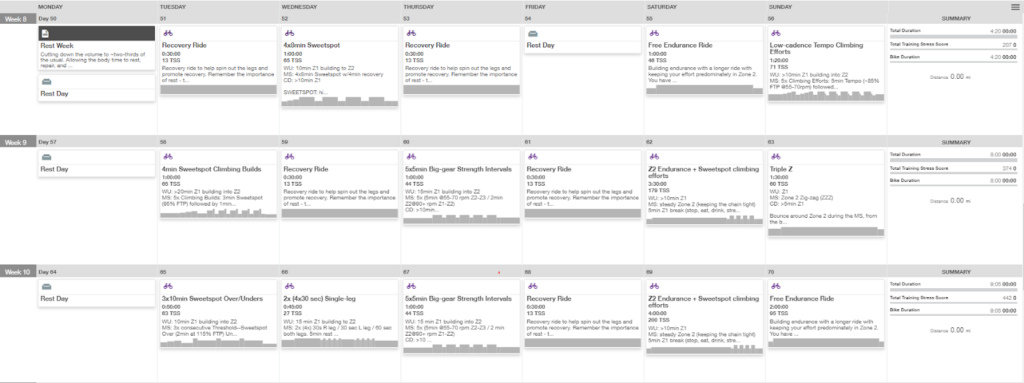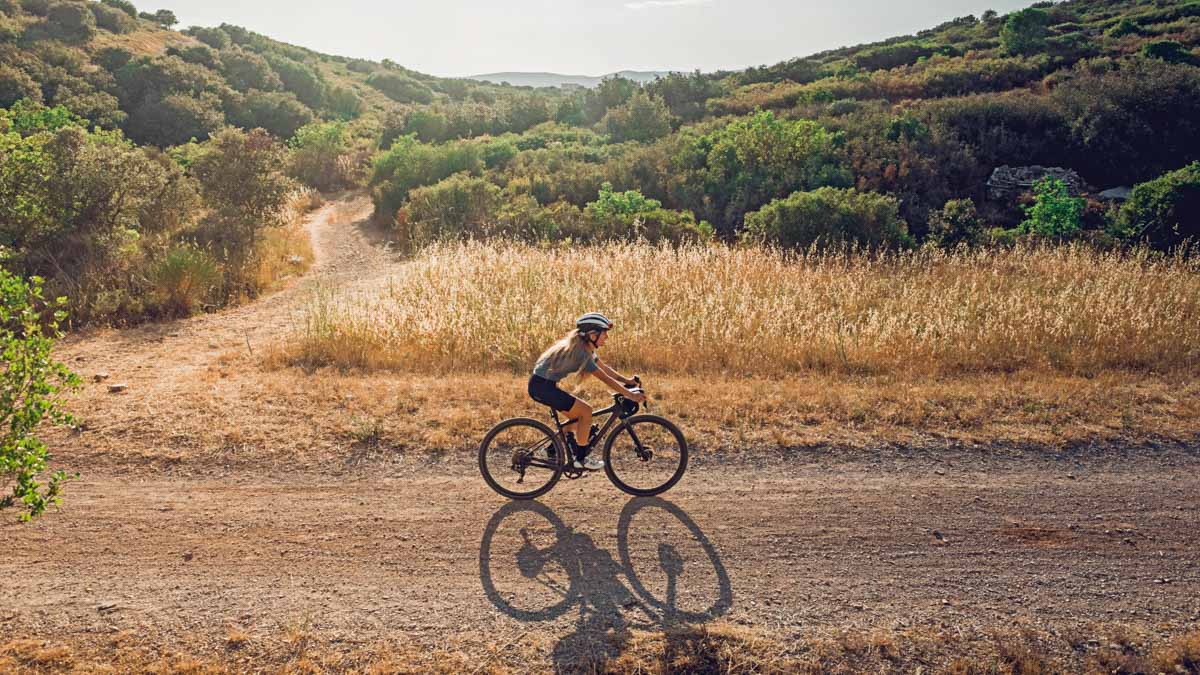Many of us get hooked on cycling once we start to achieve new distances. First, it might be riding to work. Soon you find yourself completing 10 miles, 20 miles, and then maybe even 30 miles. But once you’ve got your feet (metaphorically) on the ground, it’s time to go faster. Cycling at speed is a thrill like no other, and soon enough, you’ll find yourself flying down descents, breezing past fellow cyclists on the bike path, and feeling the urge to race. This guide will help you prepare for your first-ever bike race.
Finding a Race and Determining Your Goals
Before you start training, you need to determine what your goals are for your upcoming event. Are you aiming to finish, or to compete? Your answer will determine how much effort you’ll need to put into training.
If you’re aiming to finish, you really only need a base level of fitness — which you already have if you’ve been riding a couple of hours a week — and the right equipment.
But if you’re aiming to compete, then you’re going to have to train. This doesn’t mean pushing yourself to the brink of exhaustion every day of the week. Instead, it means that you should have a clear understanding of the challenges that will be presented in your first race, and how you measure up to completing those challenges.
You should think about your inaugural race preparation in three different ways: physical, psychological, and technical.

Physical Preparation
Physically, you need to have the strength and fitness to complete or compete in the race, which means tailoring your training to fit the physical demands of the race. For example, if you’re competing in a 30-minute criterium, you’ll need to train your sprints and high-intensity efforts to keep up with a demanding pace. But if your first race is a 100-mile gravel Fondo, you should instead focus on training your endurance capacity.
Every race offers its own set of physical demands, so it’s worth doing your homework to find out exactly what you’re getting yourself into. Besides researching the event, you can get the inside scoop by contacting the race promoter, a local cycling club, or even a local coach since it’s likely that they’ve raced the event before, or helped some of their clients prepare for it. Coaches are your best bet for quick tips, actionable advice, and answering any questions you might have before race day.
Finding the Best Training Plan for You
Once you have some more information about the race, it’s time to build a training plan. You can find thousands of training plans online, or you can hire a coach to help put one together for you. Both are valuable resources when it comes to race preparation, but hiring a coach will offer more of a personalized and helpful experience since they can communicate with you directly, mold the training plan to fit in with your work schedule and lifestyle, and adjust if something isn’t working.
Below is an example 3-week block from my 12wk Fondo Preparation Plan. Intervals and endurance rides are balanced with recovery rides and days off, creating a challenging but sustainable plan to help you prepare for your first Fondo.

Here are a few training plans to get you ready for your first Fondo, road race, or criterium:
12wk Road Race Preparation Plan
12wk Criterium Race Preparation Plan
Mental Preparation
Don’t underestimate the importance of training your mind like you do your body. The Central Governor Theory is a popular model in exercise physiology that says that the brain will regulate exercise performance, rather than the body (4). In other words, your brain will stop you from pushing too hard so that you avoid serious damage to your body, though it often stops you before any real danger is present. When you “blow up” in a race or on a climb, is your body failing, or is your brain telling you that the pain is too much?
When it comes to cycling performance, you could say that it’s equally, if not more, important to train the mind as it is to train the body. You could do all the intervals in the world, but if your mind isn’t ready to suffer on race day, you’ll crack on the very first climb.
Tips for Increasing Your Mental Strength
Every race has its own set of psychological demands, and like race-specific physical training, you can train your mind to meet the challenges of your particular race. No matter what event you choose, here are a few ways that you can increase your mental strength to help you deal with the psychological discomfort that you will experience on race day.
- To combat the universal fear of crashing, start to work on improving your bike handling skills. You can do this by riding closely beside a friend or two to simulate riding in a pack until you work yourself into joining group rides. Also, find an empty stretch of road to practice riding one-handed, grabbing your water bottle to take a drink, and looking over your shoulder while maintaining a straight line.
- Use visualization, placing yourself in the center of the action. Think about what it will look and feel like to be toeing the start line, or bumping elbows before the final sprint. Visualization allows you to rehearse a race situation in your mind before it happens, making you better prepared for when reality hits at 30 mph.
- Purposely putting yourself in uncomfortable situations is the quickest way to learn that it’s often your mind getting the best of you. If you’re afraid of riding or racing in the rain, put on your warmest rain jacket on a day when it’s pouring and ride a few laps around the block.
As one of my athletes said to me, remember that “doing your first race can be scary, but it gets easier as you go on, and you don’t have to win it! We all make mistakes as beginners, but that is a part of it.”
Technical Preparation
Finally, there are the technical demands of racing. We’re referring to bikes, wheels, tires, clothing, equipment, bike accessories such as a saddlebag, top tube bag, and the list goes on. This can be one of the most overwhelming and confusing aspects of cycling, especially for beginners. Every year, there are new bikes, wheels, products, tires, and technology released, making it impossible to keep up.
Beginner cyclists need to make sure that their bike and equipment set-up fits the demands of their race. You should not ride a Tri-bike for a gravel race, and you shouldn’t race on knobby tires in a criterium. These are obvious examples, but once you dive into the details, it can get complicated. As mentioned above, I recommend beginners talk to a local coach, bike shop, cycling club, or event organizer to gather as much information as they can about the race. Ask questions like:
- What kind of tires do you recommend for this type of gravel?
- How much pressure do you put in your tires before a crit?
- Do I need to bring a saddlebag or flat kit with me?
Dialing in your technical setup will not only help you perform to the best of your ability, but it will also help keep you safe from crashes and mechanical issues like a flat tire. Here is a helpful checklist with everything you’ll need for your first race.
Find Success with a Coach
A good coach is someone who is an expert in their field, who facilitates two-way communication with their athletes, and who uses an outside perspective to schedule their athlete’s training, plan periods of rest, and do everything they can to ensure their athlete performs at their full potential on race day.
One of the biggest benefits of hiring a coach is gaining that outsider perspective which will remove emotion from the equation when it comes to analyzing your training and fitness. One of my athletes recently said to me, “Hiring a coach has helped me keep my efforts steady and focused. I also find it beneficial to discuss mindset with someone who understands my goals.”
Working with a coach gives you a great head-start when you’re working towards a race goal. Coaches take the guesswork out of training, allowing their athletes to completely focus on their training without second-guessing their own work. Another one of my athletes said to me, “I went from spending a lot of time constructing training plans based off of YouTube videos, blog posts, etc. to being able to just hop on the bike, do my workout, and have more faith in the purpose of every workout.” TrainingPeaks is a great resource to use when you’re looking for a coach, whether you want in-person or virtual options.
In the end, bike racing is about having fun. Focus on the things that you can control — preparing your bike, studying the course, training and nutrition, and bike-handling skills — and let go of the things that you can’t, such as crashes, weather, and the competition. Cycling isn’t just a sport, it’s a community. So if you have any questions, fears, or concerns, find a local bike shop, coach, or club team and they’d be happy to help. Now it’s time to do some research, find your race, and sign up!
As you approach your race day, remember to relax, and trust in your preparation. I’ll leave you with a wonderful quote from one of my athletes: “Congrats for making it to the start! Signing up is the hard part. Putting in the weeks of work has paid off and now it’s time to enjoy your first race. Have fun!”
References
Aicale, R., Tarantino, D. & Maffulli, N. Overuse injuries in sport: a comprehensive overview. J Orthop Surg Res 13, 309 (2018). https://doi.org/10.1186/s13018-018-1017-5 https://josr-online.biomedcentral.com/articles/10.1186/s13018-018-1017-5
Baghurst, Timothy. (2012). The psychological components of elite cycling. Athletic Insight. 14. https://www.researchgate.net/publication/262375818_The_psychological_components_of_elite_cycling
Brendan M. Gabriel, Juleen R. Zierath, The Limits of Exercise Physiology: From Performance to Health, Cell Metabolism, Volume 25, Issue 5, 2017, Pages 1000-1011, ISSN 1550-4131, https://doi.org/10.1016/j.cmet.2017.04.018. https://www.sciencedirect.com/science/article/pii/S1550413117302231
Noakes TD. The central governor model of exercise regulation applied to the marathon. Sports Med. 2007;37(4-5):374-7. doi: 10.2165/00007256-200737040-00026. PMID: 17465612. https://pubmed.ncbi.nlm.nih.gov/17465612/
Seiler, Stephen & Tønnessen, Espen. (2009). Intervals, Thresholds, and Long Slow Distance: the Role of Intensity and Duration in Endurance Training. SPORTSCIENCE · sportsci.org. 13. 32-53. http://www.sportsci.org/2009/ss.htm
Taboas Lorenzo, Juan Carlos. (2010). ‘TEAM MENTAL TOUGHNESS’: A CASE STUDY OF PROFESSIONAL ROAD CYCLING. https://www.researchgate.net/publication/262064378_’TEAM_MENTAL_TOUGHNESS’_A_CASE_STUDY_OF_PROFESSIONAL_ROAD_CYCLING









